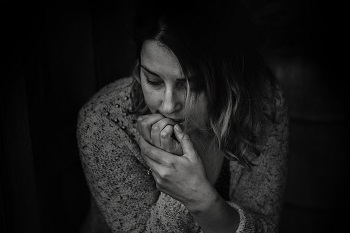
For Rape Survivors, Words Can Help or Harm
In the United States, one in five women and one in 71 men will be raped at some point in their lives. 63% of sexual assaults are not reported to police, with rape being the most under-reported crime. These statistics make people uncomfortable, as many don’t realize how common and underreported these crimes are. As a sexual assault line counsellor, I have witnessed first-hand the suffering such violations can cause. Survivors are left with feelings of shame, guilt, disgust, insecurity and grief. It is one of the cruelest violations of both body and dignity.
Jennifer Thomson, a rape survivor and healing advocate, spoke with the Trauma and Mental Health Report (TMHR) about the needs of rape survivors:
“What you say has power. Your words can be a tombstone or a stepping stone, they can bury me or lift me. What we need is someone to share the pain with. You can’t fix it but you can lend an ear.”
Taking survivors’ needs into account is crucial to supporting them mentally and emotionally. Research shows that survivors need to be validated, regain agency, and have their confidentiality respected. Empowerment is important in supporting survivors who often feel unsure about the situation and ask questions like: “Why me?” or “Was it something I did?”. Empowerment can be about understanding that it wasn’t their fault and that the responsibility is on the person who harmed them.

In an interview with the TMHR, Julie Schelter, the coordinator of “Revive”, a Restorative Justice program that addresses conflict and crime for people who have been affected by sexual assault, explained:
“Sometimes survivors will talk about shame. They’ll talk about needing support around understanding that it wasn’t their fault, the anger they may feel, and the impact this event has had on their lives. Sometimes they talk about how difficult it is to have hope for the future. There’s a lot of discussion about different ways that people aren’t coping. The most important thing for survivors is that they are believed when they are sharing their story, that the person sitting with them believes what they’re sharing and is going to just sit and compassionately listen to what they’re expressing. Another important thing for survivors is choice. They want choices in the kind of support they receive. Some people want an individual counselor to speak with. Some people prefer group support. Some people want support from their family and friends.”
According to Schelter, when speaking to survivors, we need to take the following into consideration:
“We really have to take our cues from the survivor, and give them the support they need. We should be sensitive to what they’re willing to talk about, and what they don’t want to talk about…What survivors really need is a compassionate presence, somebody that is OK to hear whatever they want to share and that is going to be here for them no matter what.”
Linda Reimer is a forensics nurse at the Emergency Domestic Abuse and Sexual Assault (DASA) Care Centre of York Region, Canada who provides free services to abuse and assault survivors. In an interview with the TMHR, she explained how her work supports these individuals:
“We only ask questions that have medical and forensic relevance. The majority of the cases that we see are young women between the ages of 14 to 24, but we also see men, children, and elderly people. Some people come to see us because they don’t know what happened. They think something happened, but they’re not sure. They may have woken up in a strange environment or their clothing was altered or they have a memory lapse of the evening before. So in circumstances like that, we have drug facilitated sexual assault assessments where we go through a number of indicators of memory lapse and indicators of potential sexual assault. We offer them the option of having their blood and urine tested in case they were drugged. And we offer them the option to have sexually transmitted infection testing done in case there was a sexual encounter.”

Survivors may not report their attack to the police because that can be a process of re-traumatization. Being questioned about the event and having to re-live it again and again is terrifying. Not reporting also occurs for historical reasons which make individuals uncomfortable interacting with a hospital or the police.
Additionally, research indicates that environmental factors, such as having a prior relationship with the assailant, are the main reasons for not reporting assaults. Also, survivors are less willing to report due to issues that may arise from coming forward. These issues include others not believing their story, stigma surrounding the use of alcohol or drugs, and fear of disrupting family dynamics upon disclosure of a relative as the offender.
Reimer explains that survivors often experience negative responses upon disclosure. This type of response only contributes to the stigmatization a survivor endures:
“They might respond in a shocked, disbelieving way. Oh, my God no, he wouldn’t do that. Uncle Bob wouldn’t do that. What did you do to make that happen? Why were you out so late? Were you drinking? We hear this even from judges. What were you wearing? Why didn’t you keep your knees together? You know, it’s these sorts of ridiculous myths that are embedded in society and the culture around women and sexual assault.”
-Eleni Neofytou, Contributing Writer
Image Credits:
Feature: Kristina Flour at Unsplash, Creative Commons
First: Jane Fox at Flickr, Creative Commons
Second: Kat Jayne at Pexels, Creative Commons




Yep. As a male survivor of rape I have been re-traumatised by use of the wrong words or phrase. I am English and one of our respected female psychiatrists on meeting me for the very first time said. “Ah you are the man that has been buggered a lot “ (a very derogatory term in England.)
As to restorative justice. He took my Virginity, and made me do unspeakable things. How can you restore that to my psyche?
This happened 50 years ago, and I still go to bed with nightmares.
I was raped and sexual exploited by my Psychiatrist. I reported him to the police and the Texas Medical Board… this happened in 2019 and this Psychiatrist still see patients today. I feel raped twice, from the Dr and from the Justice system.
If you can help me please email me…
Iberyj@gmail.com
Thank you